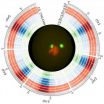Brain study reveals the roots of chocolate temptations
2012-09-20
(Press-News.org) Researchers have new evidence in rats to explain how it is that chocolate candies can be so completely irresistible. The urge to overeat such deliciously sweet and fatty treats traces to an unexpected part of the brain and its production of a natural, opium-like chemical, according to a report published online on September 20th in Current Biology, a Cell Press publication.
"This means that the brain has more extensive systems to make individuals want to overconsume rewards than previously thought," said Alexandra DiFeliceantonio of the University of Michigan, Ann Arbor. "It may be one reason why overconsumption is a problem today."
DiFeliceantonio's team made the discovery by giving rats an artificial boost with a drug delivered straight to a brain region called the neostriatum. Those animals gorged themselves on more than twice the number of M&M chocolates than they would otherwise have eaten. The researchers also found that enkephalin, the natural drug-like chemical produced in that same brain region, surged when rats began to eat the candy-coated morsels, too.
It's not that enkephalins or similar drugs make the rats like the chocolates more, the researchers say, but rather that the brain chemicals increase their desire and impulse to eat them.
The findings reveal a surprising extension of the neostriatum's role, as DiFeliceantonio notes that the brain region had primarily been linked to movement. And there is reason to expect that the findings in rats can tell us a lot about our own binge-eating tendencies.
"The same brain area we tested here is active when obese people see foods and when drug addicts see drug scenes," she says. "It seems likely that our enkephalin findings in rats mean that this neurotransmitter may drive some forms of overconsumption and addiction in people."
The researchers now hope to unravel a related phenomenon that some of us might wish we could do more to control: what happens in our brains when we pass by our favorite fast food restaurant and feel that sudden desire to stop.
###
DiFeliceantonio et al.: "Enkephalin surges in dorsal neostriatum as a signal to eat."
Image: Figure 1, Current Biology, DiFeliceantonio et al.: "Enkephalin surges in dorsal neostriatum as a signal to eat."
END
ELSE PRESS RELEASES FROM THIS DATE:
2012-09-20
Scientists have been trying to explain the causes of diabetes for many years. Researchers at the University of Copenhagen and Novo Nordisk A/S have now shown that the increased activity of one particular iron-transport protein destroys insulin-producing beta cells. In addition, the new research shows that mice without this iron transporter are protected against developing diabetes. These results have just been published in the prestigious journal Cell Metabolism.
Almost 300,000 Danes have diabetes – 80 per cent have type-2 diabetes, a so-called lifestyle disease. The ...
2012-09-20
In any living organism, all cells have the same DNA, but each cell's identity is defined by the combination of genes that are turned on or off, any given moment in time. In animals, this cellular memory is erased between generations, so that the new egg has no memory and, as such, has the potential to become any type of cell. In flowering plants, on the contrary, cellular memory passes from generation to generation, with potentially harmful implications for the development of new plants. In the latest issue of the journal Cell*, scientists from Instituto Gulbenkian de ...
2012-09-20
In the body's ongoing effort to maintain a healthy weight, an arsenal of cellular proteins called androgen receptors is critical for blocking fat accumulation. Now researchers reporting in the September issue of the Cell Press Journal Chemistry & Biology have discovered that naturally occurring steroids called glucocorticoids can thwart the receptors' activity, ultimately encouraging fat buildup.
"This has implications in this era of an obesity epidemic," says senior author Dr. Michael Mancini, from Baylor College of Medicine. "If you can reduce glucocorticoids, you might ...
2012-09-20
EUGENE, Ore. -- (Sept. 20, 2012) -- University of Oregon scientists have found a way to correctly reproduce not only the structure but also important thermodynamic quantities such as pressure and compressibility of a large, multiscale system at variable levels of molecular coarse-graining.
The method is a mathematically driven predictive modeling of a real system, built on liquid state theory, and utilizing powerful computing resources. The team's theory appears in the Sept. 21 issue of the journal Physical Review Letters.
Understanding multiscale systems is of vital ...
2012-09-20
The cost of sequencing the entire human genome, or exome – the regions of the genome that are translated into proteins that affect cell behavior – has decreased significantly, to the point where the cost of looking at the majority of a patient's genomic data may be less expensive than undertaking one or two targeted genetic tests. While efficient, the acquisition of this much genetic data – in some cases as many as 1.5 to 2 million variants – creates other challenges.
In a paper that appears today in the advance online edition of Genetics in Medicine, researchers from ...
2012-09-20
Anyone who wants to lose weight has a wide variety of diets to choose from, but knowledge of what works is often poor. Researchers at Karolinska Institutet and Uppsala University have now evaluated a Swedish commercial weight loss programme called Itrim, and found it to be effective. After one year, participants had lost 11 kg on average.
"Most of the participants lost a lot of weight in the first three months and then showed very good weight stability after one year," says Erik Hemmingsson, researcher at Karolinska Institutet and Karolinska University Hospital's Obesity ...
2012-09-20
On average, children in Switzerland are 9 years old when they use the internet for the first time. They spend on average 64 minutes per day online, which is substantially less than the European average (88 minutes). These are the results of a new study carried out by the Institut für Publizistikwissenschaft und Medienforschung (Institute of Mass Communication and Media Research) at the University of Zurich. The survey was conducted in the German-speaking and western part of Switzerland with 1,000 children and young people as well as one of their parents in each case.
Internet ...
2012-09-20
We are not all the same when it comes to illness. In fact, the risk of developing a disease such as diabetes or heart disease varies from one individual to another. A study led by Emmanouil Dermitzakis, Louis-Jeantet Professor at the Faculty of Medicine of the University of Geneva (UNIGE) reveals that the genetic predisposition to develop certain diseases may differ from one individual to another depending on their sex. Together with his collaborators, the professor has shown that genetic variants have a different impact on the level of gene expression between men and women. ...
2012-09-20
Nurses can play a key role in feeding people and restoring their humanity in times of great crisis and this was very evident during their little-known involvement in the liberation of Bergen-Belsen at the end of World War Two. That is the key finding of a historical research paper published in the October issue of the Journal of Clinical Nursing.
"Much has been written about the role of the armed forces and medical teams during this distressing time in our history, but the contribution of nurses is rarely mentioned when it comes to the liberation of this concentration ...
2012-09-20
A study at the Universitat Rovira i Virgili and the Catalan Institute of Human Paleoecology and Social Evolution (IPHES) reveals that humans from the Upper Palaeolithic Age recycled their stone artefacts to be put to other uses. The study is based on burnt artefacts found in the Molí del Salt site in Tarragona, Spain.
The recycling of stone tools during Prehistoric times has hardly been dealt with due to the difficulties in verifying such practices in archaeological records. Nonetheless, it is possible to find some evidence, as demonstrated in a study published in the ...
LAST 30 PRESS RELEASES:
[Press-News.org] Brain study reveals the roots of chocolate temptations

